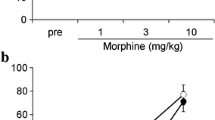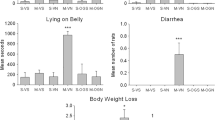Abstract.
Rationale: (1S,3aS)-8-(2,3,3,4,5,6-hexahydro-1H-phenalen-1-yl)-1-phenyl-1,3,8-triazaspiro[4.5]decan-4-one (Ro 64-6198), a non-peptidic agonist for the opioid receptor-like1 (ORL1) receptor, exhibits anxiolytic properties in stressful conditions. Objective: The present study was aimed at evaluating whether activation of ORL1 receptors by Ro 64-6198 may reverse the anorectic effect of restraint stress or intracerebroventricular (ICV) CRF injection. Methods: In body restraint experiments, 20-h food deprived rats were treated with intraperitoneal (IP) injection of Ro 64-6198 or vehicle. Ten minutes later, they were confined in cylindrical Plexiglas tubes for 60 min and then returned to their cage with food. In CRF experiments, 20-h food deprived rats were IP injected with Ro 64-6198 or vehicle. Ten minutes later, they received ICV CRF, 200 ng/rat or vehicle; food was offered after 20 min. Results: Intraperitoneal (IP) pretreatment with Ro 64-6198 reversed the hypophagic effect induced by both restraint or CRF; the effect was statistically significant at the three doses tested (0.3, 1.0 or 2.5 mg/kg). ICV administration of the selective ORL1 receptor antagonist [Nphe1]NC(1–13)NH2 (two injections of 33 or 66 µg/rat) abolished the effect of Ro 64-6198 on CRF-induced anorexia. In freely feeding rats, Ro 64-6198 significantly increased feeding at 2.5, but not at 0.3 or 1.0 mg/kg; in food deprived rats, Ro 64-6198 (0.3 or 1.0 mg/kg) did not modify food intake. Thus, reversal of stress- and CRF-induced anorexia by Ro 64-6198 can be evoked at doses lower than those that are hyperphagic. Ro 64-6198 (1 or 2.5 mg/kg) did not modify the anorectic effect of E. coli lipopolysaccharide, suggesting that its effect is selective for stress- or CRF-induced anorexia. Lastly, the benzodiazepine diazepam was unable to reduce the anorectic effect of CRF at the anxiolytic dose of 0.3 mg/kg, and partially reduced it at the hyperphagic dose of 1 mg/kg. Conclusions: The results of this study show that the non-peptidic ORL1 receptor agonist Ro 64-6198 markedly and selectively inhibits the anorectic effect of stress and CRF, and provide evidence that this effect is mediated by ORL1 receptors. Thus, Ro 64-6198 may represent an interesting tool for treatment of stress-induced anorexia.
Similar content being viewed by others
Author information
Authors and Affiliations
Additional information
Electronic Publication
Rights and permissions
About this article
Cite this article
Ciccocioppo, R., Biondini, M., Antonelli, L. et al. Reversal of stress- and CRF-induced anorexia in rats by the synthetic nociceptin/orphanin FQ receptor agonist, Ro 64-6198. Psychopharmacology 161, 113–119 (2002). https://doi.org/10.1007/s00213-002-1020-7
Received:
Accepted:
Issue Date:
DOI: https://doi.org/10.1007/s00213-002-1020-7




